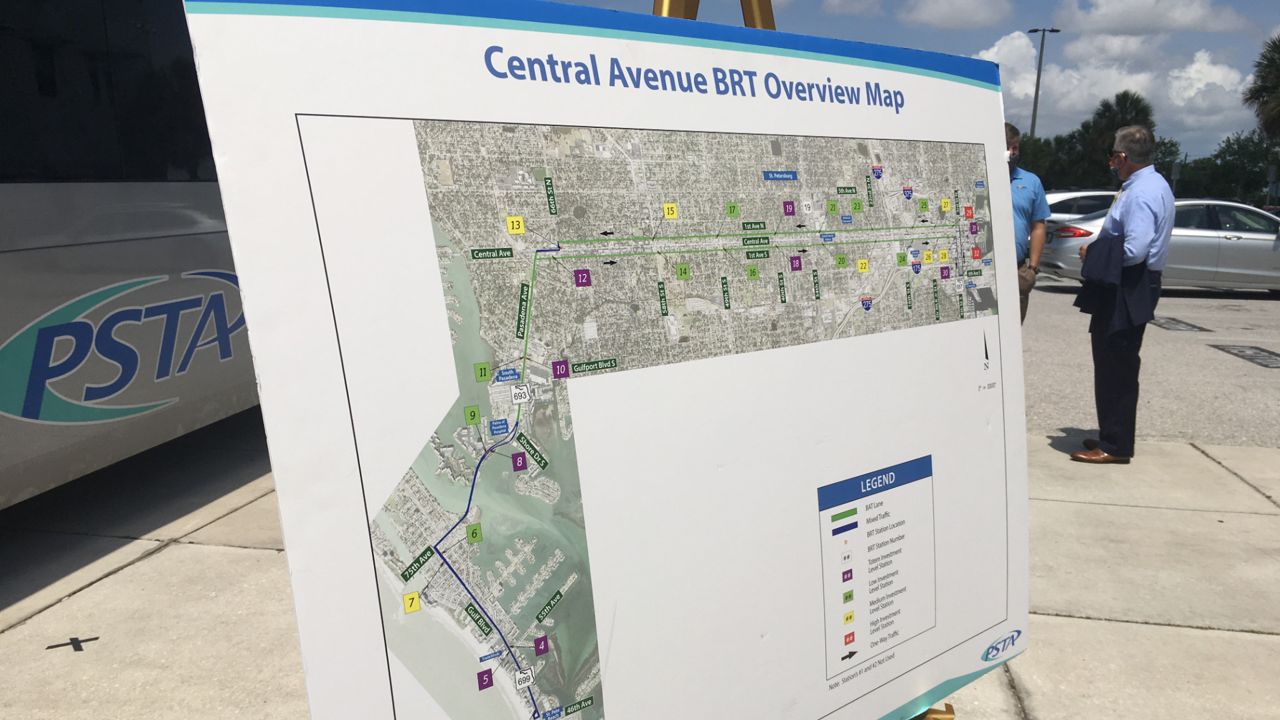ST. PETERSBURG, Fla. - The $21.8 million in federal funds awarded to the Pinellas Suncoast Transit Authority for its Bus Rapid Transit system won't just allow for work on the first BRT in Tampa Bay to move forward. Officials said it also represents the largest single investment in public transportation in the history of the region.
What You Need To Know
- President Trump announced $21.8 million in funding for the BRT project on Twitter Thursday
- BRT will connect downtown St. Petersburg to county's beaches
- This would be the first transit system of its kind in the region
"This investment makes public transportation in our region a whole lot better. This is huge," said PSTA CEO Brad Miller.
The Central Avenue BRT will connect downtown St. Petersburg to Pinellas County beaches. PSTA said the buses will travel in semi-dedicated lanes, make limited stops, and include safety enhancements, like level boarding platforms.
Miller said the PSTA first applied for this funding from the U.S. Dept. of Transportation's Federal Transit Administration three years ago. The total cost of the project is $43.93 million, with funding also coming from the Florida Dept. of Transportation's New Starts Program and Design Grant, as well as contributions from the city of St. Petersburg and PSTA.
St. Petersburg Mayor Rick Kriseman the project will improve quality of life in the region and benefit the environment by giving people the option to use mass transit.
"If we're going to compete for the businesses that we want to bring to the Tampa Bay area, to St. Petersburg, to Pinellas County, we have to have great mass transit because the other communities we're competing with around the country have that. We need it. If we have it, they'll come here because we're better than they are," said Kriseman.
Spectrum Bay News 9's Real Time Traffic Expert Chuck Henson said a project like this is a long time coming to the region.
"Over the course of the past decade, there have been two unsuccessful transportation initiatives in Tampa Bay, both shot down by voters. Then last fall, we had the All For Transportation initiative that passed and is now being held up in the state Supreme Court. That funding may never be seen, right? This funding is real. This is happening. So finally, for the first time, Tampa Bay's going to get a way to connect parts of our community that have never been connected before," said Henson.
FDOT District 7 Secretary David Gwynn said during a news conference announcing the award that this project is important because it aims to reduce traffic congestion without widening roadways. That's a strategy Henson said has failed elsewhere.
"Atlanta took I-75 and widened it to eight lanes in each direction, and people just filled it with cars. You know, we can't expand our way out of transit problems," he said.
But not everyone was happy to learn of the federal funding. St. Pete Beach passed a resolution against the BRT last June. Mayor Alan Johnson said the main concern was that the plan called for use of 60-ft. articulated buses.
“I want public transit to connect us to the mainland, but that’s about where it stops,” said Johnson. “It doesn’t take much to ride up and down Gulf Blvd. and realize that even the trollies that we now have are very — they obstruct traffic and we’ve got a bad enough traffic problem.”
PSTA said it's made changes to the project at the city's request. They include using 40-ft. buses, removing the city as a funding partner, and moving the project terminal from the Don Cesar hotel to the county beach access park. Johnson said he hasn't seen anything official on the changes yet.
"We don't want to be collateral damage for Bus Rapid Transit in St. Petersburg. So, we'll just have to see where that goes. But we're still talking to them. It's not like we're going to explode this whole thing," Johnson said.
BRT construction is expected to be complete late next year or in early 2022.



